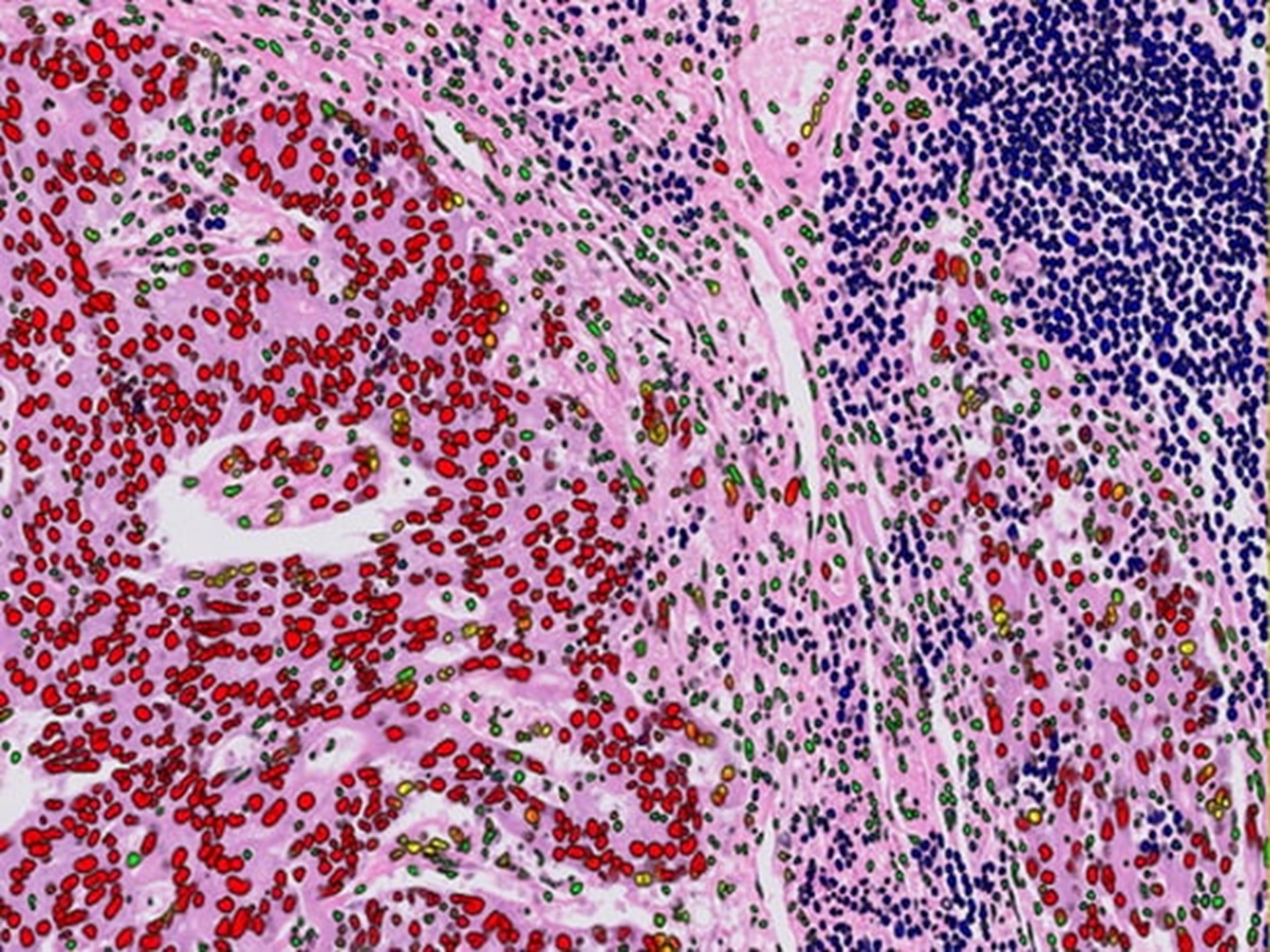_c5cf92e3-5731-4eb8-84af-025cf9fe0cd7.jpg)
Image: A cancer sample pathology slide showing computerised data points. Credit: ICR/Royal Marsden IPU.
England’s first centre of its kind is set to make significant improvements in cancer diagnosis and treatment – by combining pioneering digital imaging with artificial intelligence.
The Institute of Cancer Research, London, and its hospital partner The Royal Marsden NHS Foundation Trust have today announced the opening of their new joint Integrated Pathology Unit (IPU).
The Unit will enable researchers, who are particularly focusing on clinical trial research, to make discoveries to develop new tests for cancer and speed up the diagnosis process for results.
The IPU – funded by The Royal Marsden Cancer Charity, The Institute of Cancer Research (ICR) and The National Institute for Health and Care Research (NIHR) Royal Marsden and ICR Biomedical Research Centre – is the first Unit of its kind in England, with access to a large portfolio of pioneering clinical trials.
Modern era for pathology
It will bring pathology into the modern era through state-of-the-art laboratory techniques, sophisticated computing tools and AI, helping pathologists lead new research programmes and improving the diagnosis and treatment of cancer for patients at The Royal Marsden and other cancer centres.
Pathology, which is the microscopic interpretation of tissues and cells in diseases, is a key component in directing the care of cancer patients. The pathology assessment establishes the diagnosis of cancer, indicates the cancer sub-type, provides clues on the outcome of the disease, and helps to predict how well a patient will respond to a given treatment.
It is calculated that 80% of diagnoses and treatments in hospitals are dictated by the pathology analysis.
Integrated pathology: our pioneering research combines digital pathology and artificial intelligence
Pathologists working at the new Unit, based in the NIHR Centre for Molecular Pathology in Sutton, are already digitising tissue samples taken from patients being treated at The Royal Marsden, or patients undergoing clinical trials in other cancer centres around the UK – as well as tissue research images generated in the IPU or other ICR research laboratories.
Examples of work already under way at the IPU include the conversion of glass slides of patient’s tissue samples into digital slides, which can be viewed and analysed by sophisticated tumour imaging systems on a computer – which in turn can identify important clues about tumours that are not visible to the naked eye.
The slides can be easily shared with colleagues and assessed alongside molecular, radiology and other clinical data.
Digital translation
Researchers at the IPU – which is one of the most advanced translational digital pathology operations in Europe – are also combining digital pathology, tissue hybridisation and AI technologies to help better understand key aspects of cancer.
New technologies they will develop could also reveal how different cancers interact with their environment as they develop and spread and help to diagnose patients more precisely.
This research could lead to new tests that will diagnose cancer more accurately, as well tests to determine how a patient may respond to a new treatment they have not yet received.
Researchers are also using computer algorithms to measure tumour boundaries and the make-up of cancer tissues more accurately – for example measuring the levels of key cancer proteins and predicting a tumour’s individual genetic signature, both of which can influence treatment options.
In the future, images analysed by machine learning could make earlier assessments on whether treatment is working.
IPU Director Professor Manuel Salto-Tellez, Professor of Integrated Pathology at The Institute of Cancer Research, London, and Clinical Consultant at The Royal Marsden, said:
“Digital pathology is a new frontier in cancer diagnosis and treatment and represents a chance to make a significant difference to the way we understand, diagnose and treat cancer. Our Integrated Pathology Unit is combining state-of-the-art laboratory techniques with innovative computing tools, driven by international experts in biology, pathology and computer science. We will bring this to bear on the patient pathway at one of the world’s leading cancer hospitals – and thereby open the opportunity for cancer patients to live longer and better lives.”
Professor David Cunningham, Director of Clinical Research at The Royal Marsden and Director of the NIHR Biomedical Research Centre at The Royal Marsden and the ICR, said:
“The research taking place at the new Integrated Pathology Unit will help us understand cancer better, which could have a significant impact on survival rates and quality of life for cancer patients. Being able to understand how cancers develop and spread may influence treatment options for patients, and new research could result in pioneering tests which may help to diagnose cancer more precisely. I’m excited for what the future holds, and to see how new research discoveries may impact cancer patients in the future.”
Professor Kristian Helin, Chief Executive at The Institute of Cancer Research, London, said:
“The development of the IPU – along with our colleagues at The Royal Marsden – as one of Europe’s leading centres for digital pathology, is an important part of our mission to defeat cancer. Digital pathology is set to hand scientists and clinicians a whole new set of tools to understand, diagnose, and treat cancer. Thanks to our close partnership with The Royal Marsden, we have a special opportunity to collect data, use them for our research, and create new diagnostic technologies and treatments that can hopefully directly benefit cancer patients.”
